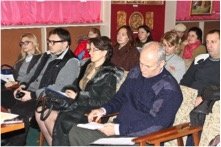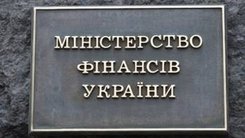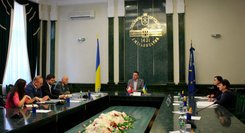Extractive Industry of Donetsk Region: What’s Needed to Achieve Transparency and Balance?
03 November 2016

A seminar Achieving Transparency in Extractive Industry: A Step towards Strengthening Local Financial Initiative was held in Kostiantynivka on 3 November. Speaking at the event, civic activists from various settlements in the region, representatives of regional media outlets, and local governments discussed the problems of extractive sector of the Donetsk oblast and the prospects for implementation of the Extractive Industries Transparency Initiative (EITI). The topic also got some extractive companies interested, as representatives of the Chasiv Yar Integrated Refractory Works took an active part in the discussion.
The Donetsk region has a powerful extractive sector dominated by coalmining industry, which provides 70% of Ukraine’s total coal production, and more than 80% of coking coal. It remains a controversial, nontransparent sector, which suffers from a range of both financial and environmental problems.
The environmental condition of the majority of mining territories in the region is critical; heightened environmental hazard is observed in the areas of liquidated coalmines, which is accompanied by water-logging, pollution of aquifers with mine waters, subsidence etc. All those present agreed that given such environmental problems, it is essential to have a legislatively secured targeted use of environmental tax in full for environmental protection activities.
A lively discussion emerged around the problem of redistribution of funds received from rent and other taxes paid by extractive companies. “In the Donetsk oblast, one can give lots of examples, where a coalmine take is located in the jurisdiction of one community, into whose budget taxes are paid, while waste with all the adverse environmental consequences and hazards to the population is dumped into another community, and this matter remains unregulated in the Ukrainian legislation,” says Lina Pliushchakova, editor of the Ekologiia promyslovoho kraiu (Ecology of the industrial region) regional newspaper.
Maria Nykytiuk, a representative of the Donetsk Oblast State Administration, spoke in support of EITI implementation, underlining that both local governments and the public are interested in receiving open information about the volume of raw materials extraction and actual revenues of coalmining enterprises.
Therefore, alongside information disclosure, the priority task on the Ukraine EITI (UAEITI) agenda is improving the legislative framework for the extractive sector. For the time being, territorial communities are looking for ways of establishing mutually beneficial partnerships with extractive companies.
The Donetsk region has a powerful extractive sector dominated by coalmining industry, which provides 70% of Ukraine’s total coal production, and more than 80% of coking coal. It remains a controversial, nontransparent sector, which suffers from a range of both financial and environmental problems.
The environmental condition of the majority of mining territories in the region is critical; heightened environmental hazard is observed in the areas of liquidated coalmines, which is accompanied by water-logging, pollution of aquifers with mine waters, subsidence etc. All those present agreed that given such environmental problems, it is essential to have a legislatively secured targeted use of environmental tax in full for environmental protection activities.
A lively discussion emerged around the problem of redistribution of funds received from rent and other taxes paid by extractive companies. “In the Donetsk oblast, one can give lots of examples, where a coalmine take is located in the jurisdiction of one community, into whose budget taxes are paid, while waste with all the adverse environmental consequences and hazards to the population is dumped into another community, and this matter remains unregulated in the Ukrainian legislation,” says Lina Pliushchakova, editor of the Ekologiia promyslovoho kraiu (Ecology of the industrial region) regional newspaper.
Maria Nykytiuk, a representative of the Donetsk Oblast State Administration, spoke in support of EITI implementation, underlining that both local governments and the public are interested in receiving open information about the volume of raw materials extraction and actual revenues of coalmining enterprises.
Therefore, alongside information disclosure, the priority task on the Ukraine EITI (UAEITI) agenda is improving the legislative framework for the extractive sector. For the time being, territorial communities are looking for ways of establishing mutually beneficial partnerships with extractive companies.
Experts of the NOVA Energia NGO shared some success stories of such collaboration and presented the main phases in developing a joint strategy for improving infrastructure in a region with extractive companies.
The analysis of licenses for extraction of oil, natural gas, gas condensate, and coal in the Donetsk oblast conducted by experts of the NOVA Energia NGO under the Municipal Finance Strengthening Initiative (MFSI-II) Roll-out Project with regard to assisting in realization of the Extractive Industries Transparency Initiative (EITI) in Ukraine, has shown that a significant proportion of them (about 40%) will expire in 2017-2020, which would allow territorial communities in the nearest future to negotiate with extractive companies regarding license extensions already on the new terms, which would meet the criteria of honest partnership and environmental safety.
Other news
19 October 2021
25 February 2020







 Glyanec
Glyanec